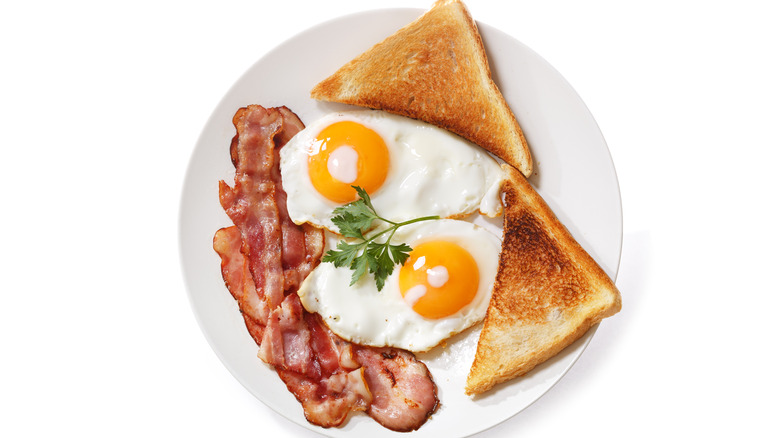Why You Should Think Twice Before Eating Bacon And Eggs
Bacon and eggs are a breakfast staple. Whether scrambled, over easy, in an omelet, or in sandwich form, many people enjoy this dynamic duo a few times a week. But do the health benefits match the popularity?
Experts say while there are nutritional benefits to eggs and bacon separately, combining the two can present difficulties for digestion. Among benefits like vitamins and antioxidants, both eggs and bacon are high in protein, which is a typically a good addition to your diet.
Registered Dietitian Haley Hammer tells Health Digest that doubling up on protein with bacon and eggs can be difficult for your body to digest at once. This is due to protein being the hardest of the three macronutrients for your body to break down.
The combination of eggs and bacon can also be problematic from a saturated fat perspective. One large egg holds 71% of the American Heart Association's daily saturated fat limit, and combining the two gets you even closer to the limit (via Livestrong). Bacon also contains a lot of fat and sodium, but the serving size typically is small, so it shouldn't be overly concerning when consumed on its own in moderation (via Healthline).
Breakfast alternatives to bacon and eggs
So what alternatives do you have for breakfast if you're trying to avoid bacon and eggs? Hammer suggested replacing bacon with complex carbs like whole grain toast or fruit with your eggs, or keep the bacon and add in avocado toast with tomato instead of eggs.
And if you just can't give up your favorite breakfast pairing, remember that moderation is key. Discuss your nutrition plan with a dietitian or consult with your medical team if you have specific concerns about your health. Preparation is also important. If you are going to enjoy bacon and eggs, try to avoid frying both the bacon and the eggs. Poaching, soft-boiling, or hard-cooking your eggs are options, as well as scrambling them in a nonstick pan.


